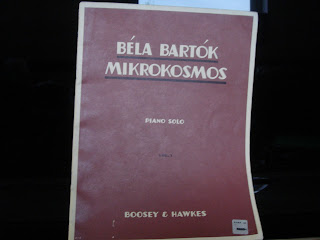If you've ever had a brush with education or psychology you may have encountered the terms extrinsic and intrinsic motivation. Put simply and according to my layperson's understanding, intrinsic motivation is that feeling or reasoning from within us that compels us to work at something. Extrinsic motivation is the name for the external factors that have the same result. So, you might want to do well in a test because of either the feeling of satisfaction that it gives you (intrinsic motivation) or because you might win a prize (extrinsic motivation). Generally speaking, most studies show that intrinsic motivation is a far more powerful and long-lasting motivator.
What does this mean in terms of your child's piano practice? Well, it means that all your encouragement, praise and rewards are not as strong a motivator for your child as you'd like them to be. While your child naturally values your attention and approbation, and enjoys the sweet at the end of practice, the effect of these will be short-lived. Given the choice between missing out on a sweet but getting to skip practice for once, your child may well choose the latter. In Amy Chu's book
Battle Hymn of the Tiger Mother she recounts an incident where she threatened to give away her daughter's dollhouse to charity if she refused to practice. The girl calmly replied, "I thought you were going to the Salvation Army, why are you still here?". Tough kid!
In my previous post I discussed some ideas on how to tackle those off days when motivation is low. If your child is only motivated by your promptings and encouragement, these days will be even harder to deal with. Your child has already decided that he or she doesn't value those things highly today, or at least not as high as the opportunity to relax rather than play the piano. If your child has intrinsic motivators to battle the lethargy, though, the chances of winning that battle are greater.
Developing intrinsic motivation is a more difficult and a longer term project than the much easier offerings of praise, encouragement and reward that we routinely (hopefully) give our children in response to their efforts in life. To generate that desire to practice within your child takes a lot of thought and effort.
Self-image
One of our most powerful motivators is our sense of ourselves. We tend to behave in accordance with how we see ourselves. So if we believe we have no self-confidence, we won't act confidently. If we identify with gregarious personalities, we're more likely to be the life and soul of the party.
Similarly, if you subtly encourage your child to see themselves as pianists, this will help develop their intrinsic motivation to practise. Like all children, my son sometimes compares himself unfavourably with his peers in terms of achievement. At these times, I never miss the opportunity to remind him that none of his classmates have been learning to play the piano for three years!
Of course, you can go overboard with this and become tiresome, so it's important not to over-egg the pudding, but a well-placed comment at an opportune moment can be very effective.
Recording achievement
It's important to have record the evidence of your child's successes. While a parent's praise, if genuine, is always valuable, it's ephemeral and easily forgotten when faced with getting over that little hump of apathy. But a visible box of programmes from performances and dvds recording those special achievements - not just concerts but home performances, compositions, reviews, long records of practice etc. - gives a visual prompt that reminds your child of the pleasure and pride they have experienced previously.
If the box is always visible your child will cease to 'see' it as it will become over-familiar, but it would be a useful thing to bring out at times of low motivation.
A sense of belonging
One aspect of human nature is the desire to belong to a group, whether it be a family, a school, a profession, a company, or even the group of people who don't want to belong to groups! If you're lucky enough to have a musical family, some part of your child's motivation is inbuilt. Unless he or she wishes to reject the family for some reason, your child will have an intrinsic motivation to practise because that's part of your family's lifestyle.
If, like me, your family isn't musical, all is not lost. By following the careers of famous pianists, by watching their performances, interviews with them and documentaries on them, you can give your child a sense that they belong to this group of people who play the piano, that they are part of a great tradition.
Similarly, if you can contact the parents of other children who are learning the piano, either through your child's teacher or their school, it could be possible to form a group with these other children. By organising outings and other social events for them, both they and your child will develop a feeling of belonging to 'the group of children who are learning to play the piano'.
I've left the prospect of joining an orchestra until last because developing pianists are rarely invited to play their instrument in an orchestral setting in the early stages of their development. They would usually be invited to take on another percussion instrument, so it may be that joining an orchestra could be counter-productive in your efforts to develop your child's intrinsic motivation to play the piano.
I hope this has given you some ideas on how to reduce the occurrence of the 'I don't want to practise' days.


















